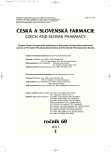-
Medical journals
- Career
Dyer’s Greenweed (Genista tinctoria L.): constituents and biological activity
Authors: Lenka Tůmová 1; Jiří Tůma 2
Authors‘ workplace: Univerzita Karlova v Praze, Farmaceutická fakulta Hradec Králové, Katedra farmakognozie 1; Univerzita Hradec Králové, Přírodovědecká fakulta, Katedra biologie 2
Published in: Čes. slov. Farm., 2011; 60, 61-64
Category: Review Articles
Overview
The paper aims to specify all important active principles in the herb Genista tinctoria which exert different biological activities. It also mentions the methods of chemical evaluation of these substances.
Key words:
Genista tinctoria – isoflavonoids – quinolizidine alkaloids – in vitro
Sources
1. Korbelář, J., Endris, Z.: Naše rostliny v lékařství. Praha: Avicenum 1985; 216–217.
2. Janča, J., Zentrich, J. A.: Herbář léčivých rostlin, 2. díl. Praha: Eminent 1995; 264–267.
3. Luczkiewicz, M., Migas, P., Kokotkiewicz, A., Walijewska, M., Cisowski, W.: Two-dimensional TLC with Adsorbent Gradient for Separation of Quinolidizine Alkaloids in the Herb and in vitro Cultures of several Genista Species. Journal of Plant Chromatography 2004; 17, 89–94.
4. Resen, I., Veit, M.: Simultaneous Determination of Phenolics and Alkaloids Using Ion Exchange Chromatography for sample. Preparation Phytochemical Analysis. 1995; 6, 121–124.
5. Mikelová, R., Klejdus, B., Zehnálek, J., Vacek, J.: Chromatografické stanovení isoflavonů ve vegetativních a generativních částech rostlin sóje (Glycine max). CHEMagazín 2004; 14, 13–15.
6. Luczkiewicz, M., Głód, D.: Callus cultures of Genista plants-in vitro material producing high amounts of isoflavones of phytoestrogenic activity. Plant Science 2003; 165, 1101–1108.
7. Bello, R., Barrachina, M. D., Martínez-Cuesta, M. A., Esplugues, J.: Pharmacological Screening of the Methanol and Dichlormethanol Extracts of Genista patens. Phytotherapy Research 1995; 9, 495–499.
8. Ososki, L. A., Kennelly, E. J.: Phytoestrogens: a Review of the present state of research, Phytotherapy Research 2003; 17, 845–869.
9. Jedinak, A., Farago, J., Psenakova, I., Maliar, T.: Approaches to flavonoid production in plant tissue culture. Biologia 2004; 59, 697–710.
10. Borges, C., Martinho, P., Martins, A., Rauter, A. P., Ferreira, M. A. A.: Structural characterisation of flavonoids and flavonoid-O-glycosides extracted from Genista tenerea by fast atom bombardement tandem mass. Rapid communications in mass spectrometry 2001; 15, 1760–1767.
11. Rainova, L., Nakov, N., Bogdanova, S., Minkov, E.: Ulceroprotective activity of the flavonoids of Genista rumelica Vel. Phytotherapy Research 1988; 2, 137–139.
12. Garritano, S., Pinto, B., Giachi, I., Pistelli, L., Reali, D.: Assessment of estrogenic activity of flavonoids from Mediterranean plants using an in vitro short-term test. Phytomedicine 2005; 12, 143–145.
13. Aaron, M. Rashotte, Hyun Sook Chae, Bridey, B., Maxwell, J., Kieber, J.: The interaction of cytokinin with other signals.Physiologia Plantarum 2005; 123, 184.
14. Dostál J.: Nová květena ČSSR. 1. díl. Praha: Academia 1989; 516.
15. Luczkiewicz, M., Głód, D., Bączek, T., Buciński, A.: LC-DAD UV and LC-MS for the Analysis of Isoflavones and Flavones from in vitro and in vivo biomass of Genista tinctoria L. Chromatographia 2004; 60, 179–185.
16. Buton, B. J., Patel, N.: Phytoestrogens for Osteoporosis. Clinical Reviews in Bone and Mineral Metabolism 2004; 2, 341–356.
17. Wu, Q., Wang, M., Simon, J. E.: Analytical methods to determine phytoestrogenic Compounds. Journal of Chromatography B 2004; 812, 325–355.
18. Knöfel, D., Schütte, R. H.: Chinolizidinalkaloide: Konstitution und Konfiguration von Tinctorin aus Genista tinctoria. Journal fűr Praktische Chemie 2004; 312, 887–895.
19. Federici, E., Touché, A., Choquart, S., Avanti, O., Fay, L., Offord, E., Courtois, D.: Hihg isoflavone content and estrogenic activity of 25-year old Glycine max tissue cultures. Phytochemistry 2003; 64, 717–724.
20. http://faf.vfu.cz/html/index.2html (staženo 15. 3. 2006).
Labels
Pharmacy Clinical pharmacology
Article was published inCzech and Slovak Pharmacy

2011 Issue 2-
All articles in this issue
- Myasthenia gravis – current treatment standards and emerging drugs
- Pelletization of melts and liquids
- Dyer’s Greenweed (Genista tinctoria L.): constituents and biological activity
- Bacteriocins produced by lactic acid bacteria
- Generic substitution, replacement and substitution of drugs: contemporary extent
- Study of local anaesthetics – Part 194 Evaluation of carbopol hydrogels with lidocaine
- Analytical evaluation of mono[{3-[4-(2-etoxyetoxy)-benzoyloxy]-2-hydroxypropyl}-isopropyl-ammonium]fumarate
- Czech and Slovak Pharmacy
- Journal archive
- Current issue
- Online only
- About the journal
Most read in this issue- Generic substitution, replacement and substitution of drugs: contemporary extent
- Myasthenia gravis – current treatment standards and emerging drugs
- Bacteriocins produced by lactic acid bacteria
- Pelletization of melts and liquids
Login#ADS_BOTTOM_SCRIPTS#Forgotten passwordEnter the email address that you registered with. We will send you instructions on how to set a new password.
- Career

